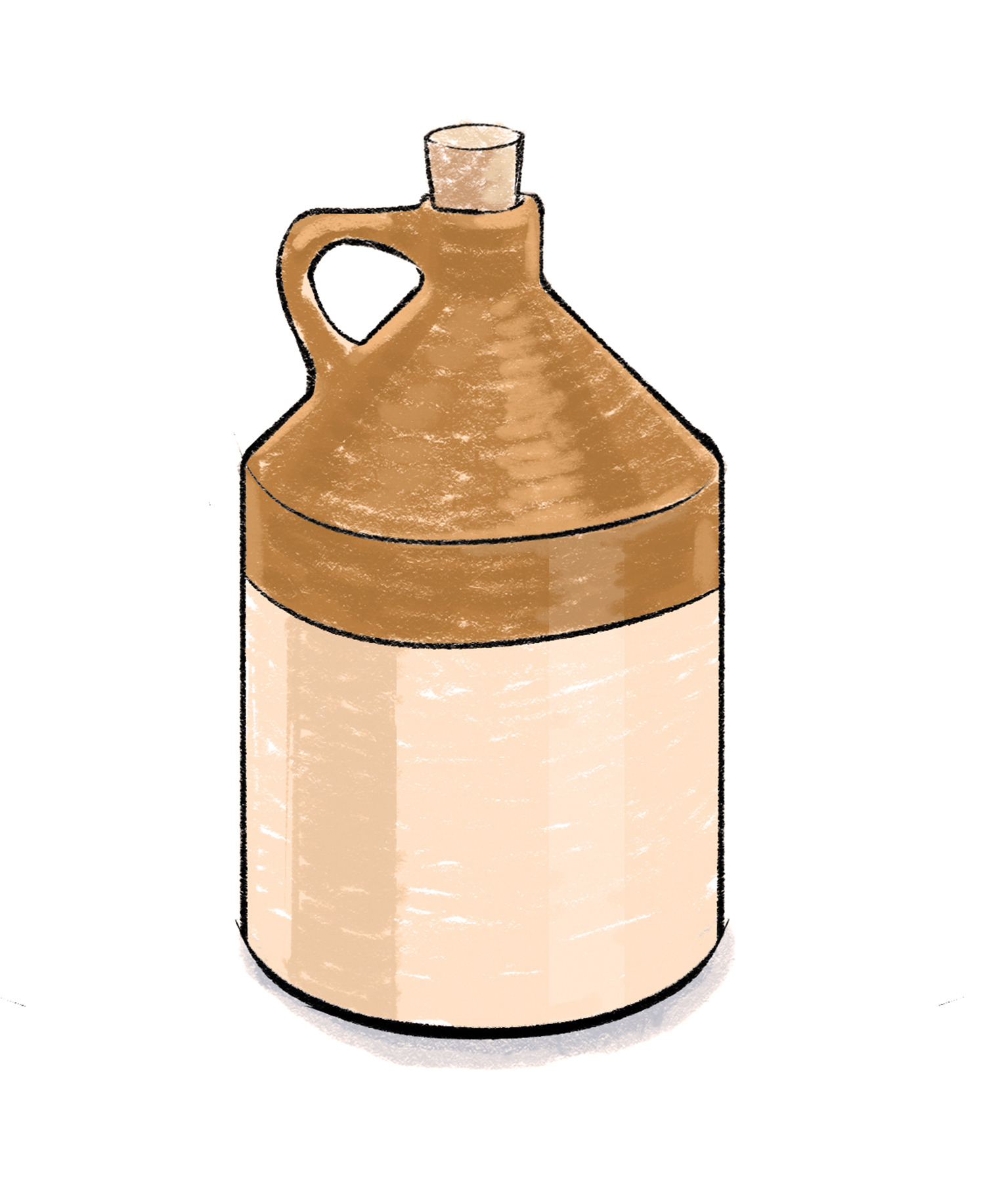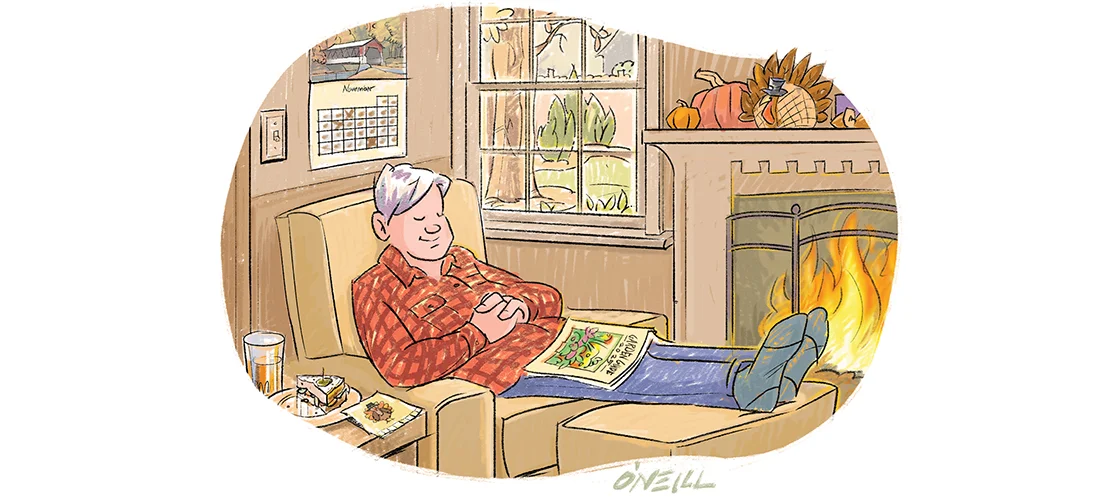Gone but not forgotten
The legendary newspaperwoman who changed my life
by Jim Dodson
Illustration by Gerry ONeill
According to latest government projections, a record 3.7 million high school kids and 4.1 million college students will graduate this spring. In a world turned upside down by partisan politics and unpredictable economics, worries about the future are understandable.
Once upon a time, I was there myself, waiting for the direction of my life to present itself. In late spring 1976, America’s bicentennial year, I was enrolled in a new MFA writing program at UNC Greensboro and working part time for my dad in advertising until I could figure out what to do with my life. America was slowly coming out of a powerful recession, and job prospects were thin on the ground.
Sadly — or maybe not — I turned out to be a lousy ad salesman. I could talk up a storm with my old man’s clients but never quite close the deal.
I also had an alternative plan of caddying for a year on the PGA Tour, which proved to be a bust when I was assigned a wisecracking CBS TV star for the Wednesday celebrity pro-am who’d never played the game. He told vulgar jokes to young women in the crowd and roguishly passed gas loudly to amuse the gallery. After a long and humiliating afternoon fetching my client’s lost golf balls from creeks, backyards and thorny bushes, he handed me a $2 tip and advised with a wink, “Don’t spend all that in one place, Sonny.”
I hurried straight to the Sedgefield Country Club bar with just that in mind.
At that early hour, the bar was empty save for an elderly gentleman nursing a cocktail. As I drank my beer, to my shock and delight, I realized the man at the end of the bar was none other than Henry Longhurst, the celebrated Sunday Times golf writer and CBS commentator — one of my literary heroes.
“Young man,” he spoke up with his charming grumble, “you look like I feel most mornings when confronting myself in the bathroom mirror.”
When I mentioned my horrible afternoon of caddying for a farting buffoon who killed my dream of working on the Tour, Henry “Longthirst” simply smiled. He asked what other options I had in mind. Confessing that my heart wasn’t into my graduate studies, I boldly commented that my real goal was to someday become a golf writer.
Longhurst nodded and slowly rose, placing a fiver on the counter. As he headed to the door, he placed his hand on my shoulder and said quietly, “Well, young man, if you do decide to write about this ancient game, you will find no shortage of rogues, bounders and peculiar characters, but also inspiring champions and some of the finest people on Earth. Good luck to you, then!”
I was thrilled by this encounter, taking it as a sign that the universe would deliver something good down the fairway of life.

A few days later, I received a phone call from Juanita Weekley, the managing editor of the city’s beloved afternoon newspaper, where I’d interned for two summers. She invited me to drop by for an interview.
“Be here at 5:30 sharp,” she said. “But don’t get your hopes up. You have lots of competition.”
I found her alone in her office the next afternoon. “Come in and close the door,” she said in her famous no-nonsense way.
Mrs. Weekley was a newspaper pioneer, the first woman to edit a major newspaper in the state, who reminded me of Lou Grant, the crusty editor from The Mary Tyler Moore Show.
As I sat down, she pointed to a stack of folders on her desk. “These are applications from half a dozen outstanding candidates for this job … My question to you is, why should I even consider a skinny white kid from the west side of Greensboro?”
Brazenly, I replied, “Because I’ll write circles around them all.”
Madam Weekley did not appear amused. Instead, she reached over her desk, picked up the wickedest-looking letter opener I’d ever seen and tapped it slowly on her desk.
“OK,” she said after a long pause. “I’m going to take a chance on you. But listen closely. If you’re not the best damn writer in this newspaper in a year, I’ll chase you out of the building with this thing.”
I spent the next year writing like mad to avoid being run off by her sharp tongue and even sharper letter opener. At one point, however, Mrs. Weekley called me into her office and handed me the keys to a wheezing, 1970 Day-Glo orange AMC Pacer staff car and instructed me to drive a 75-mile circumference around the Gate City, searching for “good stories about country life” for the Sunday paper.
“Think of it this way,” she said. “You’ll be our version of Charles Kuralt, writing about rural life and colorful characters you meet along the way. It’s right up your alley.”
She wasn’t wrong.
Over the next six weeks, roaming the backroads of the western Piedmont and the Blue Ridge foothills country, I found an assortment of fascinating small-town stories and colorful folks to write about, including several homegrown artists, a brilliant Yale-educated physician running a clinic in an impoverished mountain town, an award-winning poet, a famous moonshiner and a talent-show winner whose mom invited me to marry her daughter after she graduated from high school. I politely declined.
Looking back, it was the best job any rookie reporter ever had — one that shaped my life.
My “country” tales won a major newspaper award and landed me a staff job at the Sunday magazine of the Atlanta Journal-Constitution.
Two decades later, I was back in my hometown on a national book tour for my bestselling memoir, Final Rounds.
I stopped off to say hello to the pioneering woman who took a chance on me way back when, and bring her a signed copy of my book.
Weekley was in declining health. But her face lit up when she opened the door. We hugged and sat for an hour, and I thanked her for not running me off with her letter opener.
As she walked me to the door, she took my hand. “I knew you were going to be a superb writer,” she said, holding back tears. “I just didn’t want you to know that! I couldn’t be prouder of you, dear. Hiring you was one of the best things I ever did in my career.”
I kissed her cheek and thanked her. “It would never have happened,” I said, “without you.”
Juanita Weekley passed away in 2003.
Gone but never forgotten.
Jim Dodson is a writer in Greensboro. His 17th book, The Road That Made America: A Modern Pilgrim Travels the Great Wagon Road, will be published on July 1 and is available for pre-order on Amazon.

